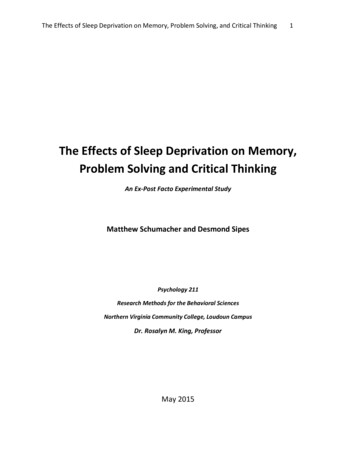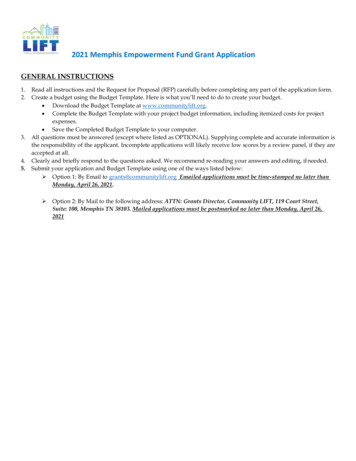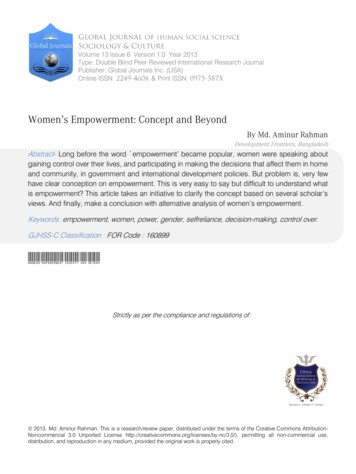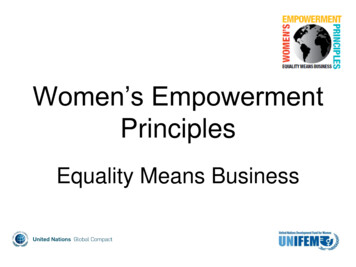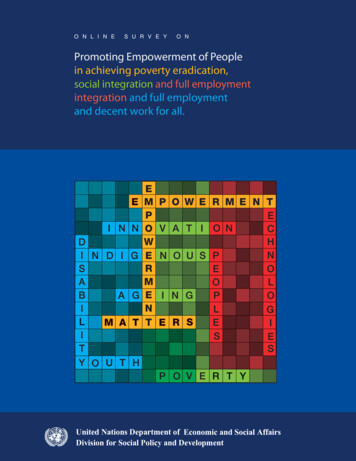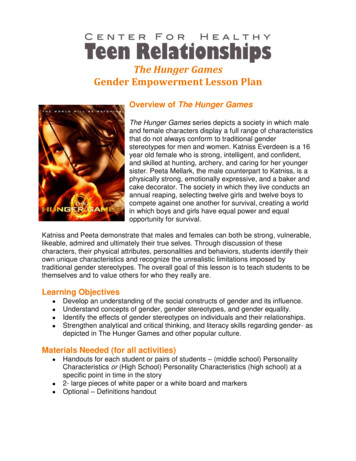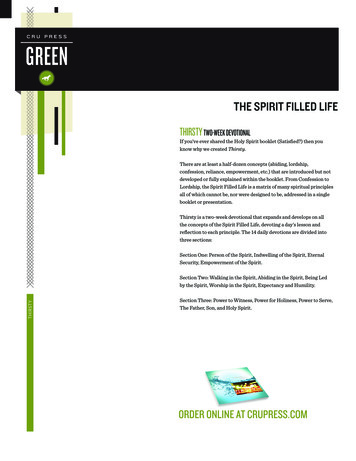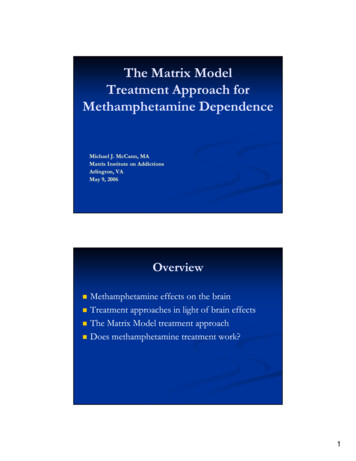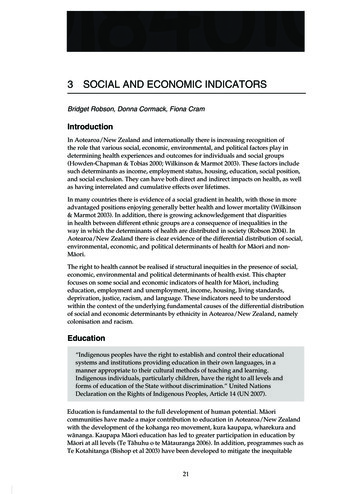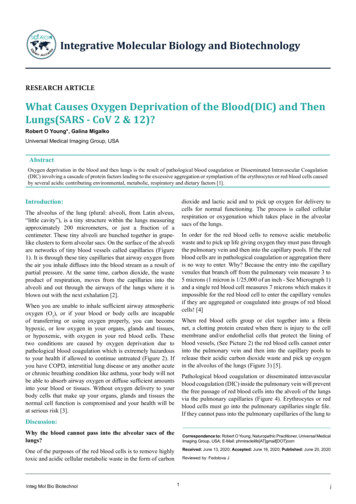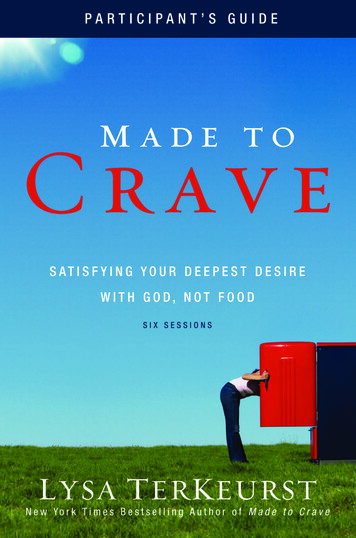
Transcription
SESSION1From Deprivation to EmpowermentWelcome!Welcome to Session 1 of Made to Crave. You’re about to embark on a spiritualadventure with great physical benefits! If this is your first time together as agroup, take a moment to introduce yourselves to each other before watchingthe video. Then let’s get started!Video: From Deprivation to Empowerment(20 MINUTES)As you watch the video, use the outline below to follow along or to take noteson anything that stands out to you.NotesGod made you wonderful. (Psalm 139)Indulge: To take unrestrained pleasure in something.“Dear friends, I urge you, as aliens and strangers in the world, to abstainfrom sinful desires, which [wage] war against your soul.” (1 Peter 2:11)11
12 / M A DE TO C R AV E PA RT ICIPA N T ’ S GU IDEMade to Crave is not about helping you to find your how-to; it’s abouthelping you find your want-to.r How-to diet programsr Want-to the spiritual and mental motivation to make lasting changesStory of the rich young man. (Matthew 19:16 – 26)r “If anyone would come after me, he must deny himself and take up hiscross and follow me.” (Mark 8:34)r Food isn’t bad, but it’s a problem when it sabotages you mentally,physically, and spiritually.r I had to be really honest. The thing I thought about, ran to, took comfortin, found refuge in, turned to and depended on, was food way more thanit was Jesus.This is a spiritual journey that will reap wonderful physical benefits.If we can look at healthy options and make the healthy choices — and notfeel deprived but instead feel empowered — everything will change. Itwill change us mentally, spiritually, and physically.
From Deprivation to Empowerment / 13Made to Crave will help you learn how to feel empowered rather thandeprived.We were made to crave, desire, want greatly, one thing: God, not food.Group Discussion: From Deprivation to Empowerment(5 MINUTES)If your group meets for two hours, allow 10 MINUTES for this discussion.Take a few minutes to talk about what you just watched.1. What part of the teaching had the most impact on you?2. What, if anything, did you hear that you didn’t expect to hear?Group Discussion: The Vicious Cycle(10 MINUTES)If your group meets for two hours, include this discussion as part of your meeting.1. Lysa describes the vicious cycle she experienced of stepping on the scale everymorning, vowing to make healthier choices, giving in to the temptation of unhealthyfoods, feeling like a failure, and then starting all over again. How would you describeyour experiences of the vicious cycle?cont.
14 / M A DE TO C R AV E PA RT ICIPA N T ’ S GU IDE2. Do you ever feel that your struggles with food are unfair? Why or why not?Individual Activity: Assessing My Soul(5 MINUTES)Complete this activity on your own.1. Briefly review the list of statements below and place a checkmark next tothose you feel are true for you. I think about food way too much. My food choices are often high in fat or sugar. I feel embarrassed about my weight or appearance. The thought of changing how I eat makes me feel sad. I’m reluctant to bring this issue to God. I have gained and lost weight several times. I feel defeated and discouraged about issues related to weight or food. I don’t have as much physical energy as I wish I did. When I need comfort, I turn to food before I turn to God. I say negative things to myself (“You’re so fat,” “You’re ugly,” “You’re notcapable of getting your act together when it comes to food.”) I’m not sure this is an issue God cares about. I feel guilty or embarrassed about what I eat or the size of my portions. I have health concerns that are weight related. I eat foods typically considered unhealthy fast food several times a week. I eat for emotional reasons — for comfort, out of boredom, to relievestress. I sometimes feel like food is more powerful than I am. I think I will always struggle with this issue. I sometimes eat in secret or hide food. I avoid physical exertion. When it comes to food and weight, I feel like I am trapped in a viciouscycle with no way out.
From Deprivation to Empowerment / 152. Based on your responses from the checklist, circle the number belowthat best describes the degree to which you feel issues with food may bewaging war on your soul.123Issues with food are notwaging war on my soul. Iam doing this study to gainhealthy spiritual insights.45678Issues with foodare a threat to my soul.Group Discussion: Assessing My Soul910Issues with foodare waging waron my soul.(8 MINUTES)If your group meets for two hours, allow 15 MINUTES for this discussion.1. How do you respond to the idea that issues with food or weight can wagewar on your soul (1 Peter 2:11)?2. What insights or surprises did you discover in your self-assessment?3. If you feel comfortable doing so, share the statement from the IndividualActivity checklist that best describes your thoughts or feelings right now.Explain the reasons for your choice.Group Discussion: How’s Your Want-To?(15 MINUTES)If your group meets for two hours, include this discussion as part of your meeting.1. In order to eat healthier, we need a how-to (a plan for what to eat), but we also needa want-to — the spiritual and mental motivation to make lasting changes. In previousefforts at weight loss and healthy eating, what ideas, experiences, or relationships
16 / M A DE TO C R AV E PA RT ICIPA N T ’ S GU IDEfueled your want-to? In other words, what increased your motivation to make healthychoices?2. How would you describe your want-to right now? Is your spiritual and mentalmotivation low, moderate, or high? Describe the reasons for your response.Group Discussion: The Story of the Rich Young Man(13 MINUTES)If your group meets for two hours, allow 30 MINUTES for this discussion.1. Read Matthew 19:16 – 26 and Mark 8:34 aloud. In what ways do you relatethe rich young man’s struggles with his possessions to your struggles withfood?2. The rich young man is unwilling to deny himself; he doesn’t want to feeldeprived of his possessions. Lysa had similar feelings about food. Sheonce told God, “You can mess with my pride, You can mess with myanger, You can mess with my disrespectful attitude, but don’t mess withmy food.” How do you respond to the idea of allowing God to “messwith” your food?
From Deprivation to Empowerment / 173. Jesus asks us to give up being controlled by anything in life that we cravemore than we crave Him, which may feel impossible to do. But He alsosays, “With God, all things are possible.” When it comes to your issueswith food and healthy eating, what is the one “impossible” thing youwant God to make possible for you?Group Discussion: Empowerment(7 MINUTES)If your group meets for two hours, allow 15 MINUTES for this discussion.If we can learn to feel empowered rather than deprived when we make a healthychoice, everything will change.1. Imagine you are attending a party with a large buffet. In the process ofmaking healthy choices, you say no to some foods. What kinds of thingsmight you say to yourself that would make you feel deprived because ofyour choice? For example, “Why am I the only one not eating dessert?”2. What kinds of things might you say to yourself that would make you feelempowered because of your choice? For example, “I overcame temptationand made a healthy choice!”3. How hopeful do you feel that you can make this mental switch — fromfeeling deprived to feeling empowered when you make a healthy choice?
18 / M A DE TO C R AV E PA RT ICIPA N T ’ S GU IDEIndividual Activity: What I Want to Remember(2 MINUTES)Complete this activity on your own.1. Briefly review the outline and any notes you took.2. In the space below, write down the most significant thing you gained inthis session — from the teaching, activities, or discussions.What I want to remember from this session . . .Closing PrayerClose your time together with prayer.Maximize the ImpactMaximize the impact of this curriculum with six days of personal studybetween sessions, alternating every other day between reading a chapter ofthe Made to Crave book and then completing a Bible study on the theme ofthat chapter (see next page). Setting aside just twenty to thirty minutes a dayfor personal study will enable you to complete the book and Bible studies bythe end of the six-session group experience.
From Deprivation to Empowerment / 19Between-Sessions Personal Bible StudyDAYA 1:Read and ReflectRead the introduction and chapter 1 of Made to Crave. If you want to dig alittle deeper, use a notepad or journal to work through the personal reflectionquestions at the end of the chapter. Use the space below to note any insightsor questions you want to bring to the next group session.DAYA 2:What’s Reallyy Goingg on Here?We tend to think of a craving as a weakness, something that compels us to eatsomething that probably isn’t the healthiest choice. But what if our ability todesire — to crave — is something that could draw us closer to God? Would itchange the way you think about craving?I believe God made us to crave. Now before you think this is some sort of crueljoke by God, let me assure you that the object of our craving was never supposedto be food or other things people find themselves consumed by, such as sex ormoney or chasing after significance. . . . Yes, we were made to crave — long for,want greatly, desire eagerly and beg for — God. Only God. But Satan wants to doeverything possible to replace our craving for God with something else.Made to Crave, pages 20 – 211. When it comes to food cravings, we tend to go for something sweet orsalty, crunchy or soft, cool or warm.r How would you describe the kinds of foods you typically eat to satisfy acraving?
20 / M A DE TO C R AV E PA RT ICIPA N T ’ S GU IDEr What is it about this kind of food that you enjoy so much? For example,is it the creaminess of ice cream melting on your tongue? Licking spicyseasoning off your fingers? The feeling of abundance represented by awhole bag or box of something?r How do you feel before, during, and after eating your craving food?Before eating, I feel . . .While I’m eating, I feel . . .After eating, I feel . . .2. The Bible describes three specific tactics Satan uses to misdirect ourdesires and lure us away from loving God:Do not love the world or anything in the world. If anyone lovesthe world, the love of the Father is not in him. For everything in theworld — the cravings of sinful man, the lust of his eyes and the boastingof what he has and does — comes not from the Father but from theworld. (1 John 2:15 – 16, emphasis added)Using the following list, think back over the last twenty-four hours or thelast few days to see if you recognize how you may have been tempted insimilar ways.r Craving: meeting physical desires outside the will of God. In what wayswere you tempted by unhealthy desires for things such as food, alcohol,drugs, or sex?
From Deprivation to Empowerment / 21r Lust of the eyes: meeting material desires outside the will of God. In whatways were you tempted by excessive desires for material things — clothing,financial portfolio, appliances, vacation plans, cosmetics, home décor,electronics, etc.?r Boasting: meeting needs for significance outside the will of God. In whatways were you tempted by desires to prop up your significance — perhapsby name dropping, exaggerating, feigning humility or other virtues, doingsomething just because you knew it would be observed by others, etc.?In what ways was your ability to love God and love others (includingyourself) impacted by your response to these temptations?3. Read Genesis 3:6 and Matthew 4:1 – 11 to see how Satan used these samethree tactics with Eve and with Jesus. Note each temptation on the chartbelow.TEMPTATION TACTICCravingLust of the eyesBoastingEVEJESUS
22 / M A DE TO C R AV E PA RT ICIPA N T ’ S GU IDE[Eve] focused only on the object of her obsession. . . . Eve craved what she focusedon. We consume what we think about. And what we think about can consume usif we’re not careful.Made to Crave, page 234. In one sense, we could say that EEve and Jesus had similar responses totheir temptations — they both kept a laser-like focus on their desires. Thedifference between them was what they wanted most of all — what theycraved. EEve’s cravings displaced God and made Him secondary to herother desires; what mattered most to her was everything the forbiddenfruit represented. Jesus’ cravings asserted God’s supremacy over everyother desire, even a legitimate desire for food; what mattered most to Himwas the will of God. Do you see why what we crave matters so much?r Refer back to your responses to question 2. For each temptation you wrotedown, how would you describe the craving — what you wanted most ofall — behind the temptation?r How do you feel about this principle — that what we crave matters — whenit comes to our food choices?5. Jesus defeated every temptation — every lie from the enemy — by quotingthe truth of God’s Word. Truth is powerful. The more saturated weare with truth, the more powerful we’ll be in resisting our temptations,whatever form they take. As you begin this healthy eating journey, here isa strengthening truth you can soak in every day:But he said to me, “My grace is sufficient for you, for my power ismade perfect in weakness” . . . For when I am weak, then I am strong.(2 Corinthians 12:9 – 10)Your weakness with food does not disqualify you from winning thisbattle. In fact, it may be your best qualification. You’ll have to rely onGod completely, and that makes you the perfect candidate for grace.In the space provided, write a brief prayer that expresses your heart toGod as you begin this Made to Crave journey. Tell Him your fears and
From Deprivation to Empowerment / 23questions, your hopes and desires, your weaknesses and needs. Ask forHis grace, all sufficient for you.When I listen to my cravings, Ican begin to determine the needI am trying to meet by giving in tothe craving. That helps me answerthe question, “What is it I need togive to God?” — MARIETTA T.DAYA 3:Read and ReflectRead chapter 2 of Made to Crave. If you want to dig a little deeper, use a notepad or journal to work through the personal reflection questions at the end ofthe chapter. Use the space below to note any insights or questions you wantto bring to the next group session.DAYA 4:Replacingpg Myy CravingsgWhen we rely on something, we trust it and depend on it; we have confidencethat it won’t let us down. If we struggle with food, at some point we have towrestle with a very raw question: Is it possible we love and rely on food morethan we love and rely on God?I had to get honest enough to admit it: I relied on food more than I relied on God. Icraved food more than I craved God. Food was my comfort. Food was my reward.Food was my joy. Food was what I turned to in times of stress, sadness, and evenin times of happiness.Made to Crave, page 29
24 / M A DE TO C R AV E PA RT ICI PA N T ’ S GU IDE1. For each of the items listed below, use the space provided to rate thedegree to which you rely on food to give you what you need. Use thefollowing scale:3 Food is almost always the first thing I rely on.2 Food is frequently what I rely on.1 Food is occasionally what I rely on.0 Food is rarely what I rely on.When I need comfortWhen I feel sadnessWhen I want a rewardWhen I feel happinessWhen I feel joyWhen I experience boredomWhen I experience stressPick one of the items you rated as a 3 or a 2 and circle it. Keep it in mindas you respond to the following questions.r What behaviors do you typically engage in when turning to food for thatreason? For example, if you rely on food for comfort, do you secretly gettakeout from a fast food restaurant and eat it in your car, sit down in frontof the television with a bag of chips, curl up in your favorite chair with apan of warm brownies and a fork?r How do you imagine your behaviors might change if you were able toturn to God at such times? What, specifically, would you do and not doinstead?r What feelings arise when you consider the prospect of not relying on foodat such times?I determined to make God, rather than food, my focus. Each time I craved something I knew wasn’t part of my plan I used that craving as a prompt to pray. Icraved a lot. So, I found myself praying a lot.Made to Crave, pages 29 – 30
From Deprivation to Empowerment / 252. When we use our cravings as a prompt for prayer, the desires forunhealthy foods that once derailed us become stepping-stones that set uson a new path, straight to God. Here is an example of using a craving as aprompt for prayer:God, it’s 10:00 a.m. and I’m craving again. I want those snack crackers thatare literally screaming my name. But instead of reaching for those crackers,I’m praying. I’ll be honest, I don’t want to pray. I want those crackers. But,instead, I’m going to have a handful of almonds and brick by brick . . . prayerby prayer . . . lay a path for victory.Recall a recent craving that derailed you (or refer to your responses toquestion 1 above). Using this experience as a prompt, write a brief prayerthat redirects your craving to God.3. The psalms are sometimes referred to as the prayer book of the Bible.They not only teach us how to communicate with God, but they alsohelp us to express emotions and experiences that are sometimes hardto put into words. Psalm 5 is the prayer of a man who desperately needsGod’s help. He is pursued by enemies who lie about and plot againsthim — much like our enemy, Satan, lies to us and tries to use ourcravings against us. Instead of relying on his own wisdom to devise acounterattack, the psalmist pleads his case with God:Give ear to my words, O L ORD, consider my sighing. Listen to mycry for help, my King and my God, for to you I pray. In the morning, OL ORD, you hear my voice; in the morning I lay my requests before youand wait in expectation. (Psalm 5:1 – 3)r The psalmist asks God to attend to his sighing, a pain so deep he can’teven put it into words. In your struggles with food, do you experience painno words can describe? How does it impact you to know that God can heareven the things for which you have no words?
26 / M A DE TO C R AV E PA RT ICI PA N T ’ S GU IDEr The psalmist makes a case for God to act on his behalf. In effect, he says,“Here are all the reasons You had better show up and help me!” If you wereto plead your case to God, what are the top two or three reasons you wouldgive to make a case for God to help you with your cravings?r The psalmist waits in expectation for God to act. This is not a halfheartedor passive kind of waiting. To wait in expectation requires active attention.It means starting each day on a God hunt in which we are alert and on thelookout for every sign of God’s activity on our behalf.When you reflect on your past efforts at healthy eating, would you sayyou expected God to help you or did you feel more or less on your own?As you begin this Made to Crave journey, how do you feel about the idea ofrelying fully on God and expecting Him to help you every day?Food is my comfort, my friend,and my joy. . . . Food has become asort of mini-god in my life. I mustchange — not my weight or mysize, but my heart. — MARY S.The psalmist closes his prayer with abeautiful affirmation of how God protectsthose who take refuge in Him. He says,“You surround them with your shieldof love” (Psalm 5:12 NLT). And do youknow what the Bible commentaries say about what kind of shield this is?It’s a full-body shield — the kind that covers head to toe.* Whatever fearsand hurts you carry about your struggles with food, know that you aresurrounded this day, and every day, with a shield of God’s love that noenemy can penetrate. God has you covered, head to toe.*The International Bible Commentary, rev. ed., F. F. Bruce, gen. ed. (Grand Rapids:Zondervan, 1986), 561.
From Deprivation to Empowerment / 27DAYA 5:Read and ReflectRead chapter 3 of Made to Crave. If you want to dig a little deeper, use a notepad or journal to work through the personal reflection questions at the end ofeach chapter. Use the space below to note any insights or questions you wantto bring to the next group session.DAYA 6:Gettingg a PlanOne of the first steps in developing long-term healthy eating habits is choosing a realistic food plan that works for you. Maybe the word “ugh” just crossedyour mind. If so, that’s okay. The truth is, this is hard stuff. Doing the work tofind the right food plan can be challenging, but it’s essential — and worth it.I knew I needed a plan. . . . I had lost weight before but I couldn’t keep it off forany extended time. My changes were always temporary, therefore my results werealso temporary. . . . I left the nutritionist’s office that day with a plan. Under hersupervision and with a weekly weigh-in to hold me accountable, I felt empoweredfor the first time in a long while.Made to Crave, pages 36, 381. Which of the following movie titles best describes your response whenyou hear the words “food plan”? Psycho High Noon A Time to Kill Leap of Faith Do the Right Thing Independence Day Mission Impossible Les Miserables Life Is Beautiful Saving GraceEvery movie has a beginning, middle, and end. If your past experiencesEwith following a food plan were made into a movie, how would youdescribe the beginning, middle, and end of your story? (See next page.)
28 / M A DE TO C R AV E PA RT ICI PA N T ’ S GU IDEr BeginningExample: I feel hopeful as I walk through the grocery store with a cart full offresh vegetables and other healthy foods.r MiddleExample: I’m at a birthday party and there’s nothing here that’s okay for me toeat. I feel discouraged and left out. I’m tired of saying no to myself and havingto plan all my meals. I want cake — the corner piece with all the extra frosting.r EndExample: I’ve failed — again. I swear off diets and food plans forever. Rollcredits.2. How would you respond if a nutritionist were to ask you the followingquestions:r What is your biggest fear about choosing or following a food plan?r How can I help you with that fear?My problem isn’t somuch having a planas sticking to theplan. I hate feelingrestricted! — JANE D.
From Deprivation to Empowerment / 29r What words or phrases would you use to describe the kind of plan youthink might be realistic for you over the long term?3. The book of Proverbs is a wisdom book. It focuses on practical guidanceto help God’s people make good decisions — and it provides key insightsabout having a God-honoring plan. As you read through the followingverses, underline any words or phrases that stand out to you.The plans of the godly are just. (12:5a NLT)Refuse good advice and watch your plans fail; take good counsel andwatch them succeed. (15:22 MSG)Plans succeed through good counsel; don’t go to war without wiseadvice. (20:18 NLT)Good planning and hard work lead to prosperity, but hasty shortcutslead to poverty. (21:5 NLT)Commit your actions to the L ORD, and your plans will succeed. (16:3NLT)r In what ways do these verses challenge you?r In what ways do these verses encourage you?r What one piece of wisdom stands out to you as something you might relyon in choosing a healthy eating plan?
30 / M A DE TO C R AV E PA RT ICIPA N T ’ S GU IDEThis journey will require you to make some tough sacrifices, but I’ve come to lookat this process as embracing healthy choices rather than denying myself. Thereare lessons to be learned and perspectives to be gained in the season of embracinghealthy choices. These will not just be physical lessons. The mental and spirituallessons gained in this time will be the very thing that will equip you for the longhaul.Made to Crave, page 394. How do you feel about embarking on this journey to healthier eating?Circle the number below that best describes your response.12DiscouragedI feel like it’s allabout denyingmyself.34567MixedI know I will have todeny myself, but I also feelhopeful that I can makehealthier choices.8910EmpoweredI feel like it’sall about embracinghealthy choices.r What does the number you circled tell you about your current perspectiveson weight loss and healthy eating?r How do you hope this healthy eating journey might impact your currentperspectives?As you near the end of week one on this healthy eating adventure, perhapsyou’re feeling a little bit psycho, miserable, or like it’s high noon at the junkfood corral. Or maybe you have a sense that this could be your saving grace —you’re ready to do the right thing, take a leap of faith, and make decisions thatlead to your healthy eating independence day. Wherever you find yourself thisday, know that God meets you there. He loves your willingness to explore thistender area of your life and He wants to help you take every step that leadsyou closer to freedom, closer to empowerment and, most of all, closer to Him.
From Deprivation to Empowerment/13 Made to Crave will help you learn how to feel empowered rather than deprived. We were made to crave, desire, want greatly, one thing: God, not food. Group Discussion: From Deprivation to Empowerment (5 MINUTES) If your group meets for two hours, allow 10 MINUTES for this dis
